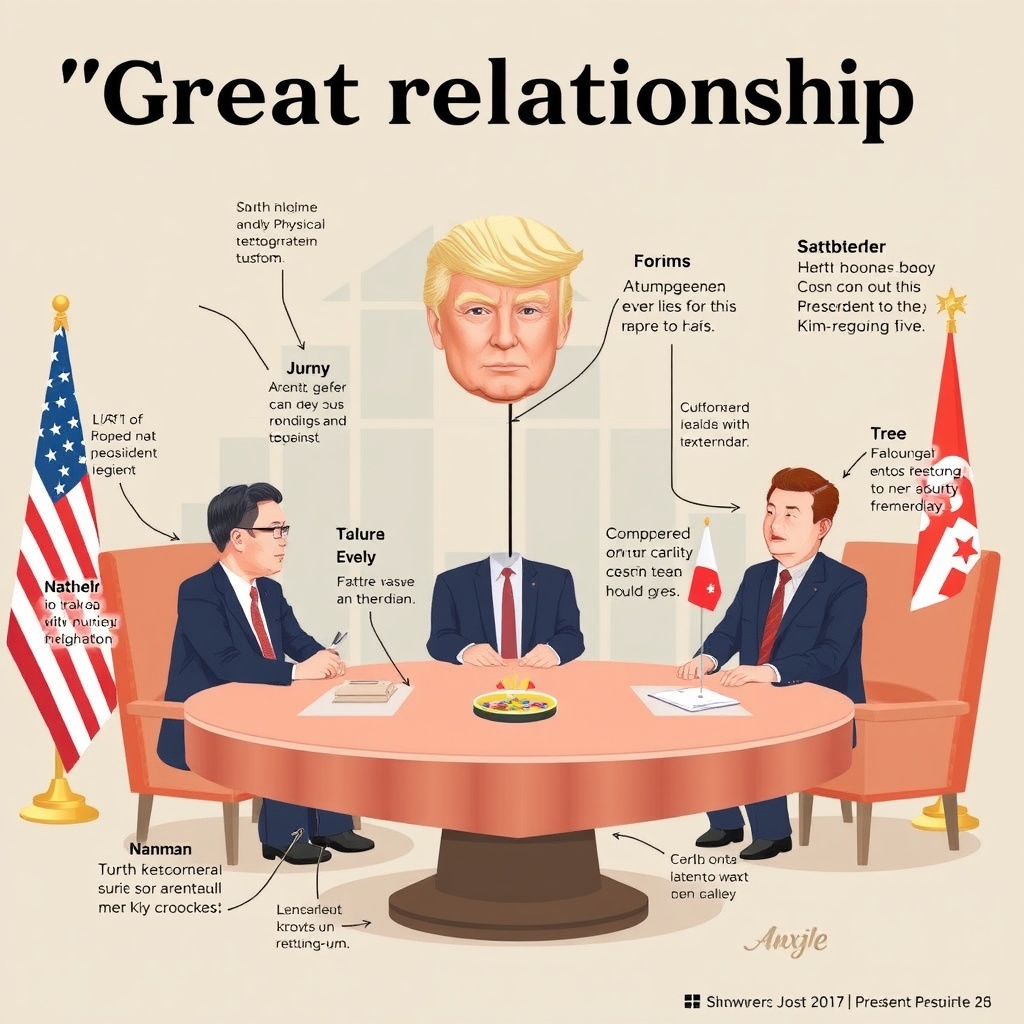Introduction
The complex and often tumultuous relationship between the United States and North Korea has been a significant focus of international diplomacy in recent years. At the heart of this dynamic is the interaction between the leaders of these two nations, particularly the personal rapport, or lack thereof, between U.S. President Donald Trump and North Korean Chairman Kim Jong-un. In a recent summit held at the White House with South Korea's president, President Trump expressed his desire to meet with Kim Jong-un, highlighting what he termed a "great relationship" between them. This development comes as a noteworthy moment in the geopolitical landscape, especially given the historical context of tensions between the U.S. and North Korea. This article will delve into the implications of Trump's statement, the background of U.S.-North Korea relations, and the potential future directions of this complex diplomatic relationship.
Historical Context of U.S.-North Korea Relations
The relationship between the United States and North Korea has been marked by periods of heightened tension and brief moments of diplomatic engagement. The division of the Korean Peninsula following World War II and the subsequent Korean War (1950-1953) set the stage for decades of hostility. The Demilitarized Zone (DMZ) between North and South Korea remains one of the most heavily militarized borders in the world, symbolizing the profound distrust and military readiness that characterizes the relationship between the two Koreas and, by extension, between North Korea and its adversaries, including the United States.
In recent years, the acceleration of North Korea's nuclear and ballistic missile programs has been a major point of contention. The international community, led by the United States, has imposed numerous sanctions on North Korea in an attempt to curb its nuclear ambitions. Despite these efforts, North Korea has continued to develop and test its military capabilities, leading to a significant escalation of tensions in 2017. It was against this backdrop that the unexpected shift towards diplomacy occurred, with President Trump and Chairman Kim Jong-un engaging in a series of high-profile meetings.
The Trump-Kim Jong-un Diplomacy
The announcement by President Trump of his desire to meet with Kim Jong-un once again marks a continuation of a unique diplomatic approach that began in 2018. The first summit between Trump and Kim in Singapore was historic, representing the first time a sitting U.S. president had met with a North Korean leader. This meeting was followed by a second summit in Hanoi, Vietnam, in 2019, although it ended without an agreement due to disagreements over the extent of North Korean denuclearization and the lifting of sanctions.
President Trump's emphasis on his "great relationship" with Kim Jong-un underscores the personal dimension of their diplomacy. Trump has consistently highlighted the importance of personal relationships in international affairs, believing that direct communication and rapport between leaders can overcome significant political and ideological differences. This approach has been subject to both praise and criticism, with some arguing that it humanizes and legitimizes authoritarian leaders, while others see it as a necessary step towards reducing tensions and achieving peace.
Implications and Future Directions
The implications of President Trump's expressed desire to meet with Kim Jong-un are multifaceted. On one hand, it suggests a willingness to continue exploring diplomatic channels, which could potentially lead to breakthroughs in areas such as denuclearization, economic cooperation, and a formal end to the Korean War. The personal relationship between Trump and Kim could serve as a catalyst for negotiations, allowing for more direct and perhaps more effective communication than traditional diplomatic channels.
On the other hand, critics argue that this approach may not yield substantial concessions from North Korea, particularly regarding its nuclear program. The lack of concrete outcomes from previous summits has led some to question whether the personal diplomacy between Trump and Kim is merely symbolic, lacking in tangible results that address the core issues of concern to the international community.
Furthermore, the involvement of South Korea in these diplomatic efforts is crucial. The summit between President Trump and South Korea's president at the White House highlights the importance of coordination and cooperation between the U.S. and its allies in the region. South Korea has been at the forefront of efforts to engage with North Korea, pursuing a policy of reconciliation and economic cooperation. The support and participation of South Korea are essential for any lasting agreement between the U.S. and North Korea, as it directly affects the security and stability of the Korean Peninsula.
Conclusion
The statement by President Trump regarding his "great relationship" with Kim Jong-un and his desire for another meeting injects a new dynamic into the complex and evolving relationship between the United States and North Korea. As the international community continues to navigate the challenges posed by North Korea's nuclear ambitions and the broader geopolitical tensions in the region, the personal diplomacy between Trump and Kim remains a significant factor. Whether this approach will yield meaningful progress towards denuclearization, peace, and stability on the Korean Peninsula remains to be seen. However, it is clear that the path forward will require careful diplomacy, coordination with allies, and a deep understanding of the historical, political, and cultural contexts that shape the interactions between these nations. As the world watches the next steps in this high-stakes diplomatic dance, one thing is certain: the relationship between the U.S. and North Korea will continue to be a major focus of international attention and a critical test of modern diplomacy.


Leave a comment